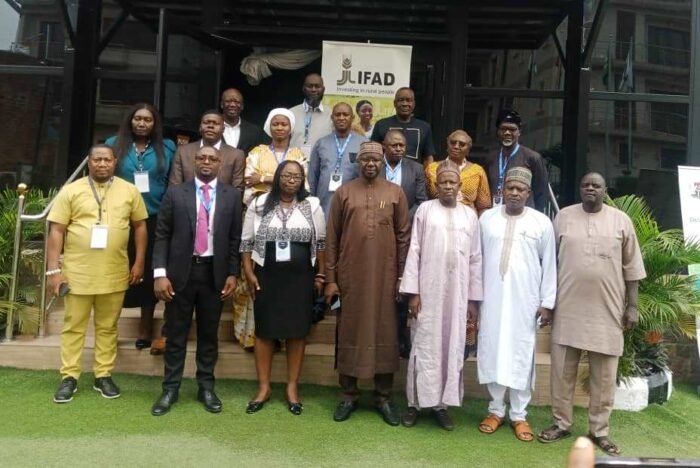By Felicia Imohimi
The International Fund for Agricultural Development (IFAD) on Wednesday trained 130 persons from Anglophone countries in West and Central Africa on financial management.
Dr Dede Ekoue, IFAD Country Director said this in Abuja at the first regional workshop on Financial Management of IFAD-Funded projects, for Anglophone countries in West and Central Africa (WCA).
The News Agency of Nigeria (NAN) reports that participants were drawn from Gambia, Ghana, Liberia, Sierra Leone and Nigeria.
Ekoue said that the training was organised by the organisation’s Financial Management Division (FMD).
She said it was to provide effective and sustainable support for the financed projects to improve the living conditions of three-quarters of the global population living below extreme poverty.
Ekoue said that to improve the quality of financial management of IFAD-funded projects and programmes, it is crucial to find methods to strengthen the capacities of stakeholders.
She recalled that IFAD-funded projects will discuss various reforms relating to Financial Management and Fiduciary Reforms within the division.
The country director explained that the primary goal of the training was to discuss and reinforce the capacity of stakeholders regarding significant FMD reforms.
This includes – principally Interim Financial Reports (IFR). Disbursement FMD WCA initiatives such as the automation of the IFRs.
“The primary objectives of the workshop are to discuss the practical implementation of the reforms, specifically the interim financial report and disbursements.
“It is to also train project coordinators on theuse of the Financial Execution (FE) module of IFAD Client Portal (ICP) for submitting financial reports.
“The workshop objectives are noble if we are to fulfill our mandate while also ensuring value for money that improves the quality and standard of living and livelihoods of the most vulnerable communities and smallholder farmers.
“Smallholder farmers are central to IFAD’s strategic objectives and mandates, ” she said.
Ekoue said the current portfolio of IFAD’s WCA region consists of 62 programmes in 23 countries, with a total financing of approximately four billion dollars of which the organisation contributes approximately 1.9billion US dollars.
According to her, it is an opportunity for participants to interact and share their experiences, and best practices on the Financial Management and fiduciary assurance of the IFAD-funded projects.
In a remark, Dr Ernest Umakhihe, Permanent Secretary, Federal Ministry of Agriculture and Rural Development identified West and Central Africa as a region of great diversity and potential.
He was represented by Mr Tanimu Ibrahim, Director Planning and Policy Coordination of the ministry.
According to him, the region is home to about 400million people, of whom about 60 per cent live in rural areas and depend on agriculture for their livelihood.
He said agriculture is also a key contributor to the region’s economic growth, trade, and food security.
Umakhihe said that the region also faces many constraints, such as climate change, conflict, instability, poverty, inequality, malnutrition, and disease.
These challenges, according to him, required concerted and coordinated efforts from all stakeholders, including governments, regional organisations, development partners, civil society, and the private sector.
“This training is very timely and relevant. Through it participants will gain new knowledge and skills on how to manage your financial resources better.
“As you all know, agriculture is a key driver of our economy, contributing about 25 per cent of our GDP and employing about70 per cent of our labour force.
“It is also a vital source of food security, income, and livelihoods for millions of our rural poor people.
“However, agriculture also faces many challenges, such as climate change, low productivity, market access, infrastructure, and governance.
“Finance management is essential for ensuring transparency, accountability, and value for money in our agricultural programmes and projects,” he said.
Also speaking, Mr Austin Tatah, Regional Financial Management Officer for IFAD in Abidjan, said IFAD has introduced a lot of reforms with regards to fund disbursement for the past few years.
Tatah said the training was an opportunity to reinforce the capacity of the project coordinators in order to optimise these reforms and embed them in their financial management system.
“We are moving from a transactional base approach to an analytical base approach with regard to how we analyse and provide disbursement to the project,” he said.
Monica Kwame-Greene, Project Coordinator for the Agriculture Value Chain Project in Sierra Leone and a participant, described financial management as key for any project.
“It is key we know the best practices and also to be able to manage funds that are for rural poor.
“We are here to learn how to manage these funds that are in the hands of the donors to the benefit of our people in different countries, ” she said. (NAN)(www.nannews.ng)
=======
Edited by Joseph Edeh












